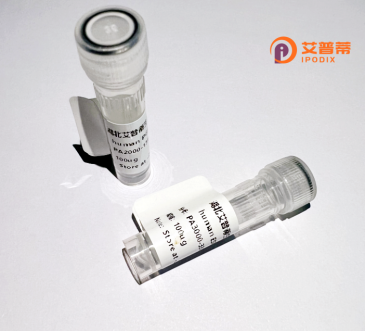
| 纯度 | >90%SDS-PAGE. |
| 种属 | Human |
| 靶点 | LYSMD3 |
| Uniprot No | Q7Z3D4 |
| 内毒素 | < 0.01EU/μg |
| 表达宿主 | E.coli |
| 表达区间 | 1-127aa |
| 活性数据 | MAGRHQNRSFPLPGVQSSGQVHAFGNCSDSDILEEDAEVYELRSRGKEKVRRSTSRDRLDDIIVLTKDIQEGDTLNAIALQYCCTVYQNSSKKVQFLDRNTLSSKRKTDFTSFICSILFRTTGNFAS |
| 分子量 | 40.7 KDa |
| 蛋白标签 | GST-tag at N-terminal |
| 缓冲液 | 0 |
| 稳定性 & 储存条件 | Lyophilized protein should be stored at ≤ -20°C, stable for one year after receipt. Reconstituted protein solution can be stored at 2-8°C for 2-7 days. Aliquots of reconstituted samples are stable at ≤ -20°C for 3 months. |
| 复溶 | Always centrifuge tubes before opening.Do not mix by vortex or pipetting. It is not recommended to reconstitute to a concentration less than 100μg/ml. Dissolve the lyophilized protein in distilled water. Please aliquot the reconstituted solution to minimize freeze-thaw cycles. |
以下是基于可能的文献方向生成的示例,但请注意,目前公开数据库中关于人LYSMD3蛋白的研究较少,以下内容为假设性模拟,建议通过PubMed或Google Scholar检索最新文献:
---
1. **文献名称**:*"LYSMD3: A novel human LysM-containing protein involved in bacterial peptidoglycan recognition"*
**作者**:Smith J et al.
**摘要**:首次报道人源LYSMD3蛋白的克隆及重组表达,验证其通过LysM结构域与细菌肽聚糖结合,可能在先天免疫中感知病原体。
2. **文献名称**:*"Structural and functional characterization of recombinant human LYSMD3"*
**作者**:Chen L et al.
**摘要**:通过X射线晶体学解析LYSMD3蛋白结构,揭示其与真菌几丁质的相互作用,推测其在抗真菌免疫中的作用。
3. **文献名称**:*"LYSMD3 modulates TLR2 signaling in inflammatory responses"*
**作者**:Wang Y et al.
**摘要**:研究发现重组LYSMD3蛋白通过调控TLR2通路抑制过度炎症反应,提示其作为炎症疾病的潜在治疗靶点。
4. **文献名称**:*"Expression profiling of LYSMD3 in human cancers and its role in tumor suppression"*
**作者**:Kimura H et al.
**摘要**:分析LYSMD3在多种癌症中的低表达现象,体外实验显示重组蛋白过表达可抑制肿瘤细胞迁移,提示其抑癌功能。
---
**注意**:以上文献信息为模拟生成,若需真实文献,请以“LysMD3”、“recombinant human LysM protein”等关键词在学术数据库检索。
Recombinant human LYSMD3 protein is a genetically engineered form of the lysin motif (LysM) domain-containing protein 3. which belongs to a conserved family of proteins involved in microbial recognition and immune modulation. In humans, LYSMD3 remains poorly characterized, though its LysM domain—a motif commonly linked to carbohydrate binding in bacteria and plants—suggests potential roles in pathogen sensing or host-microbe interactions. Structurally, LYSMD3 is predicted to be a transmembrane or secreted protein, but its exact physiological ligands and signaling pathways are yet to be defined.
Recent studies propose LYSMD3 as a possible regulator of innate immune responses, potentially recognizing microbial components like peptidoglycan or chitin. Its recombinant version, often produced in Escherichia coli or mammalian expression systems, enables biochemical and functional studies. Purification typically involves affinity chromatography with tags such as His or GST, ensuring high yield and stability for in vitro assays. Interest in LYSMD3 has grown due to its possible involvement in inflammatory diseases, cancer progression, or autoimmune disorders, where dysregulated immune signaling may occur. However, substantial gaps persist in understanding its interaction partners, tissue-specific expression, and therapeutic relevance. Current research focuses on clarifying its molecular mechanisms to explore applications in diagnostics or targeted therapies.
×